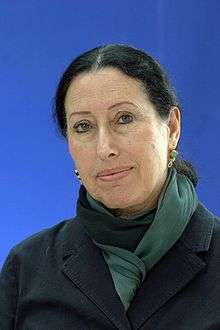Rachel Elior

Rachel Elior (born 28 December 1949) is an Israeli professor of Jewish philosophy at the Hebrew University of Jerusalem in Jerusalem, Israel. Her principal subject of research has been the history of early Jewish mysticism.[1]
Academic career
Elior is the John and Golda Cohen Professor of Jewish Philosophy and Jewish Mystical Thought at the Hebrew University, where she has taught since 1978. Currently she is the head of the Department of Jewish Thought. She earned her PhD Summa cum laude in 1976. Her specialties are early Jewish Mysticism, the Dead Sea Scrolls, Hekhalot literature, Messianism, Sabbatianism, Hasidism, Chabad,[2] Frankism and the role of women in Jewish culture.
She has been a visiting professor at Princeton University, UCL, Yeshiva University, the University of Tokyo, Doshisha University in Kyoto, Case Western Reserve University in Cleveland, in the University of Chicago and at the University of Michigan-Ann Arbor.
Elior claims that the Essenes, the supposed authors of the Dead Sea Scrolls never existed. She contends (as have Lawrence Schiffman, Moshe Goshen-Gottstein, Chaim Menachem Rabin, and others) that the Essenes were really the renegade sons of Zadok, a priestly caste banished from the Temple of Jerusalem by Greek rulers in the 2nd century BC. She conjectures that the scrolls were taken with them when they were banished. "In Qumran, the remnants of a huge library were found," Elior says, with some of the early Hebrew texts dating back to the 2nd century BC. Until the discovery of the Dead Sea Scrolls, the earliest known complete version of the Old Testament dated back to the 9th century AD. "The scrolls attest to a biblical priestly heritage," says Elior, who speculates that the scrolls were hidden in Qumran for safekeeping.[3]
She is a member of the board of the international council of the New Israel Fund.
Awards and recognition
In 2006, Elior received the Gershom Scholem Prize for Research in Kabbalah from the Israel Academy of Sciences and Humanities.[4]
References
- ↑ Gibson, Etta Prince (24 December 2004). "Hear me roar". Jerusalem Post.
- ↑ "Prophecy Now". Australian Broadcasting Corporation. 24 September 2000.
- ↑ McGirk, Tim (16 March 2009). "Scholar Claims Dead Sea Scrolls 'Authors' Never Existed". Time. Retrieved 17 March 2009.
- ↑ "Gershom Scholem Prize for Research in Kabbalah Awarded to Prof. Rachel Elior of Hebrew University". Hebrew University. 11 April 2006. Retrieved 12 January 2014.
Bibliography
- Israel Ba'al Shem Tov and his Contemporaries, Kabbalists, Sabbatians, Hasidim and Mithnagdim, Jerusalem : Carmel Publication House 2014
- Memory and Oblivion: The Secret of the Dead Sea Scrolls, Van Leer Institute and Hakibutz haMeuchad, 2009
- The Dybbuk and Jewish Women, Jerusalem and New York, Urim Publications, 2008
- Elior,, Rachel (2007). Jewish Mysticism: The Infinite Expression of Freedom, trans.Yudith Nave and Arthur B. Millman. Portland, Oregon: Littman Library of Jewish Civilization. ISBN 1-874774-67-6. OCLC 76184139.
- Elior, Rachel (2006). The Mystical Origins of Hasidism. trans. Shalom Carmy. Portland, Oregon: Littman Library of Jewish Civilization. ISBN 1-874774-84-6. OCLC 65978708.
- Heikhalot Literature and Merkavah Tradition Ancient Jewish Mysticism and its Sources, Tel Aviv: Yediot Ahronot; Sifrei Hemed: 2004 (Hebrew) ISBN 978-965-511-145-3
- Elior, Rachel (2004). The Three Temples: On the Emergence of Jewish Mysticism. Portland, Oregon: Littman Library of Jewish Civilization. ISBN 1-874774-66-8. OCLC 53223716.
- Herut al Haluhot – Studies in the Mystical Foundations of Hasidism, Tel Aviv: Broad Cast University: Defense Ministry Press 1999.
- Paneiah ha-Shonot shel ha-Herut -Iyunim be-Mistika Yehudit (Alpayim 15, Am Oved 1998)
- Elior, Rachel (1993). The Paradoxical Ascent to God: The Kabbalistic Theosophy of Habad Hasidism. Albany, New York: State University of New York Press. ISBN 0-7914-1045-5. OCLC 24378568.
- Torat HaElohut BaDor haSheni shel Hasidut Habad, Jerusalem: Hebrew University: Magnes Press 1982 (Hebrew)
- Heikhalot Zutarti: An Early Mystical Manuscript of the Mishnaic Talmudic Period, Jerusalem: Hebrew University: Magnes Press 1982 (Hebrew)
- Galia Raza: 16th Century Kabbalistic Manuscript, Jerusalem: Hebrew University 1981 (Hebrew)
- Yehudah Liebes, "Children of the sun vs. children of the moon" Haaretz 4/6/2003
- Sacha Stern, "Rachel Elior on Ancient Jewish Calendars: A Critique" Aleph: Historical Studies in Science and Judaism - Volume 5, 2005, pp. 287–292
- Peter Schaffer, Critical edition of Heikhalot Zutarti, Tarbiz 54 (1985)Hebrew, critical review of her work
- David Tamar, Critical review of her edition of Galia Razia Jerusalem Studies in Jewish Thought 2 Hebrew (1983)
External links
- Facebook page
- Prof. Elior's homepage at the Hebrew University
- Dead Sea Scrolls’ origins spark debate
- Rabinovich, Abraham (2009-05-07). "From the sun to the moon". The Jerusalem Post. Retrieved 2009-05-12.